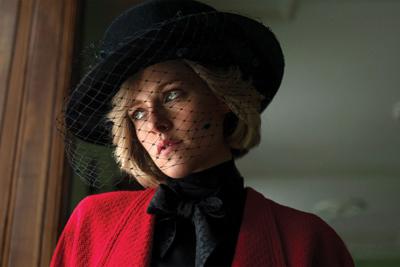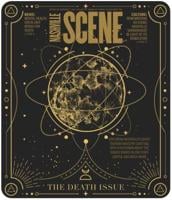Christmas can be stressy enough without having to worry about long-steeped family resentments and the death-by-papercuts that is a series of dinners with relatives who may or may not despise you. So imagine what an emotional minefield Spencer’s hypothetical early-’90s Christmas gathering was for the embattled Diana, princess of Wales. Tensions were high, the media was always on the hunt for images or information, and no matter where you turned there was a tradition designed to keep the royal family going as it had long been accustomed to. This is a film with angry wigs. Consider those hats that Laura Linney as Bertha Dorset wore in 2000’s The House of Mirth, the ones that could banish light and plunge the object of scorn into shadow with the tiniest tilt of the neck — that is the level of malign wig energy present in this film.
Spencer follows in the footsteps of Jackie, the 2016 film in which director Pablo Larraín cast a remarkable spell, with Natalie Portman crafting an excellent portrayal of Jackie Kennedy as a complex woman haunting the spaces of government and authority. This film shares a similar thematic approach, as well as a stunning performance of a woman whose political influence and public profile remain relevant decades after her passing. (Though Margaret Trudeau is still with us, I would love to see Larraín’s take on her during the late 1970s.) Kristen Stewart’s Diana is the fire of life bound by tradition and couture and compelled to haunt the halls in which the entire family has gathered. And “haunt” is the proper word, because at no point can the viewer ever escape the knowledge that Diana’s life outside of the grasp of the royals did not last very long.
Stewart is a revelation in this performance. That’s not a surprise if you’ve been paying attention, because her one-two collaborative punch with director Olivier Assayas (2014’s Clouds of Sils Maria and 2016’s Personal Shopper) let everyone know that their Bella Swan jokes would hold sway no longer. There’s a kind of ritualized incarnation here — Stewart has walked the path of designer shoes, pointed expectations and red carpets lit by flashbulbs, and that familiarity allows her Diana to feel empathetically real. Cinematographer Claire Mathon (Portrait of a Lady on Fire, Atlantics) finds the light that lets Diana push down dull maroon rage and vermilion embarrassment, letting alabaster foundation and the occasional flush of fury distinguish her skin from the myriad other royals who drift in and out of meals, events and dreams.
The film I couldn’t get out of my head while trying to process Spencer — stirring up the deepest currents in the subconscious, unblinking, raw and red — is Marina de Van’s In My Skin. There’s an unsettling mood around stories in which women live their lives as metaphors, where it becomes impossible to accurately measure the damage done to heart and head from the outside. Here we see Diana, loving mother and free spirit, tethered and tackled by centuries of expectation, ground down. The world now knows all about Charles and Camilla. The world now sees what’s being done to Meghan and Harry. And all that’s required to see what was done to Diana is taking a chronological journey through her life in photos.
The film does offer Diana some kindnesses: her children; the head of the kitchen staff at Sandringham Estate (played with empathy and pragmatism by Sean Harris, whose proto-Roy Kent voice helped him essay notable freaks and bullies in Prometheus and the last couple of Mission: Impossible movies); her dresser/confidante (Sally Hawkins, as always exceptional); and occasional visions that disrupt the tyranny of expectation, granting her (and the audience) a more heightened sense of what’s at stake during this fraught holiday gathering. Screenwriter Steven Knight (Eastern Promises, 2019’s utterly insane must-see Serenity) finds ways to reach out to those who might feel lost in Larraín’s labyrinth, little touchstones recognizable from more traditional biopics. And even if that creates moments of narrative discordance, I’m willing to call the use of a major-key stomper from a late-’80s Genesis side project an instance of pop grace — three-and-a-half minutes for Diana and William and Harry to exist outside of custom and expectation, blissfully free, unbound.





